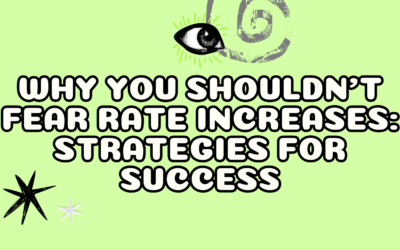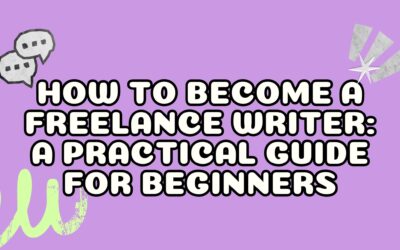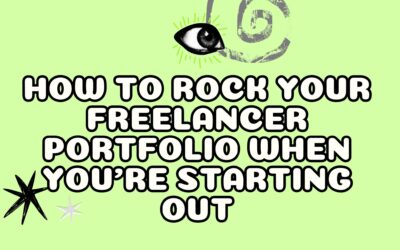Okay, let’s break this thing down. It isn’t easy to start freelancing. We all know that, right? We all know that it’s not a walk in the park or the simple act of sitting back and hoping for the best.
In fact, the early stages of freelancing are frightening. No, not just frightening. They’re absolutely terrifying. And they’re terrifying for a number of reasons:
- There is SO MUCH information out there from all different kinds of sources. How are you supposed to separate the wheat from the chaff?
- What if you’re not good enough? If you never start, you’ll never have to find out that you actually suck at freelancing, right? (Honestly, you don’t suck, but it takes time to get to a point where you’re confident enough to own it as a freelancer).
- The unknown. Oh heck, we’re all scared of the unknown. How are we supposed to know where we’ll be in one month, one year, or ten years when the path of freelancing is such a winding one?
- What if you’re doing it wrong? Fear of failure and doing the wrong thing is paralysing. Really, it can stop you in your tracks.
I’ve come to realise that these are the four main things that terrify people who want to start freelancing. Of course, there are exceptions, but for the most part every excuse or reason can be boiled down into one of these categories.
For me, I was terrified of the unknown. I had no idea what being a freelancer entailed and I kinda like to be in control of things – like, where I’m going to be in a year. Freelancing didn’t seem to give me that sense of “owning it” at the beginning of my career.
Now? Oh, now it’s a different story. I feel a lot more secure freelancing than I ever did in my full-time job because I’m in control of it. I run the show. And if I need to earn more money? Well that’s down to me.
Back to the point in hand.
I know that a LOT of freelancers freeze up because they simply don’t know how to start.
- Should they create a website for themselves?
- Should they start sending off applications left right and centre?
- Should they start blogging?
- Should they cold pitch companies?
There are so many options, right? Ideally, at some point down the line, you want to be doing all of the things. But, until then, you want to go easy on yourself.
So, first things first.
Stop Reading!
Let me take a guess: you’ve read hundreds (maybe even thousands?) of articles about freelancing, because if you’re not actually working, the next best thing is reading about it, right?
You’re learning. You’re building up your expertise, and you’re getting tips from the best.
Sure, if you want to tell yourself that, go ahead. But the reality? The more you read, the less time you’re spending on actually doing the things.
Because, like I said in my last post, most freelancers struggle to get work in the early days of their career because they’re not doing enough.
Reading about freelancing isn’t the same as freelancing (she says, while writing a post about freelancing that she hopes you’ll read – the irony is strong here, eh!).
Reading about freelancing feels like you’re doing something, but in reality, what do you have to show for it at the end of the day? A blog reader full of read pieces? An empty “promotions” folder in your inbox?
So first of all – stop reading. Partly because it stops you from doing the actual work, and partly because it will overwhelm you.
You’ll suddenly have all of these ideas from a cross-section of successful people and no time to implement them. Which, in turn, makes you feel bad and like you’re a failure.
It’s a vicious cycle, people.
After you’ve stopped reading, you want to get intentional with what you’re doing.
Now, I struggle with the word intentional sometimes, because surely everything I do is intentional because I intended to do it – unless, of course, it was a complete accident or it happened after one two many drinks and therefore it was neither clever, sensible, nor intentional.
So what do I really mean by being intentional?
I mean really being aware of why you’re doing something and how it’s going to help you get to where you want to be.
Let’s dig deeper.

3 Things to Do When You Don’t Know What to Do
1. Set Goals
I’ve been very open about not having a plan when I started freelancing. I was winging it for a good six months before I’d realised I’d hit a plateau and couldn’t see a way out.
At the back of my mind, I knew that I needed to have some kind of plan, some kind of goals, but I thought that as long as I vaguely knew in my head where I wanted to go then everything would work out.
Uh yeah, right.
So, firstly (after you stop reading), set some attainable goals. Not high-flying goals that seem unbelievably unreachable at the start of your career, but goals that are within reach.
- Start by setting a goal for the next month. Maybe you want to land one client or get one piece published, or maybe you want to get your website up and running.
- Then set a goal for the next six months. Maybe it’s an income goal, or a certain number of clients you want to have.
- Finally, set a goal for the next year. Something that builds off of your six-month goal and can be scaled to bigger and better things.
I’d recommend setting a new “main” goal at the start of each month, too, to give you some direction in your day-to-day life. It just has to be something small, like “write a blog post”, or “join 4 Facebook groups in my niche”.
Once you have goals, you have something to work towards which instantly gives you direction – something a lot of people don’t have when they start freelancing.
They also make the process a whole lot less overwhelming, because you have a single thing that you’re working towards, not multiple things that you’re trying to juggle at the same time.
2. Commit to ONE thing
The problem with the internet these days is there’s a new shiny thing popping up every week. This makes it really difficult to focus, because we constantly think we’re getting left behind.
But if you really want to get ahead in those first few weeks and months? You’re going to have to commit to something. To see it right to the end.
For example, if you plan on blogging once a week for six weeks to build up a series of clippings for your portfolio, don’t give up on week two because you’ve heard that email marketing is the new blogging.
Stick at it.
Trying to do too many things at once again leads to the feeling of absolute overwhelm, and it also hinders our progression. If we’re trying to master too many things at once, we’re not really mastering anything at all.
It’s best to really dig into one technique or method and nail that before moving on to the next for fear of becoming a jack-of-all-trades, master of none.
Think about what your goal is for the month and commit to ONE thing that complements that. If you’re goal is to land one new client, stick to cold pitching until you get some bites.
Giving up too early on things is what stops new freelancers moving forwards. They don’t give themselves a chance, and therefore they don’t give their businesses a chance.
3. Map your progress
And how do you know if you’re moving forwards? By charting your results to see how far you’ve come.
It’s easy to think that we’re a failure as a freelancer when we’ve only landed one client this month. But before that month? You had no clients so it’s a huge improvement, right?
When you start noting down where you’re putting your efforts and the results you’re getting from those efforts, you can start to see what’s working and what’s not, instead of simply shooting around in the dark.
This will then form the basis of your marketing strategy and how you will put yourself out there.
For example, if you’ve sent 50 cold pitches this month but haven’t had a single reply, maybe you need to look at the wording of your emails and how you’re presenting yourself rather than sending out even more.
If your blog posts aren’t getting seen, maybe it’s time to spend a month promoting them rather than writing more.
You see what I mean?
No, becoming a freelancer isn’t easy, but we can make it a damn sight easier by bringing focus to our activities and really thinking about what’s working, what’s not, and whether we’re moving towards our goals.
Even if you’re taking a tiny shuffle each day towards that yearly goal, that’s progress. That’s not a failure, that’s a huge success, so give yourself a pat on the back and carry on shuffling.







YES! Thank you for this post! I’ve been struggling myself to get some clients and actually start FULLY freelancing, and every single time I try to build up the courage to start pitching ideas, I psych myself out.
I love this post!
So glad you like this post, Cassie! Pitching is seriously scary, right?! I remember when I first started I wrote out loads of pitches but couldn’t always bring myself to press send. Hope this helps!
Lizzie!
Love the new website. Your graphics rock girl. Seriously!
I like your take on the goals. I always make big goals and just materialize the steps in my head. I need to write down the little steps!
At this stage of the game, my goal is to maintain my client work and focus on a new lead magnet for my blog (as well as update my course).
Great post!
Elna Cain | Freelance Writer recently posted…15 Terrible Pitching Mistakes New Freelance Writers Often Make
Thanks so much, Elna! I’m a little bit in love with the new design, and I’m so glad you like the graphics – I’m one of those people who changes their mind a lot so I’m constantly playing around with what they look like!
Love your goals – I like that you’ve got one for both your freelance work and your blog!
Awesome post Lizzie! You hit the nail on the head in the aspect that the more time you spend reading, the less time you are spending on taking inspired action.
Go with good enough and have faith in your experience and expertise that you can deliver. Sometimes, it’s about learning as you go.
Thanks, Theresa! I completely agree – learning as you go is the only way to get better and move forward.
I get this, but it didn’t really provide the answers I was hoping for. What I need to know is “How do I SET UP my freelance business?” I can set goals and I can tell you that I’m committed to writing client case studies for service-based organizations, companies, and entre/soloprenuers. But what things need to be in place FIRST before I actually start? Register my business name? Create a website? Get a client contract written up by a lawyer? Open a business account? Sign up for Freshbooks? Does that make sense? Not sure if you already have a post about that, but I could really use some guidance on that?
Hey Celise, I understand your frustrations.
In your comment you’re talking about the practical steps of setting up a business, which, in the early days can take up a lot of time but doesn’t really move you forward. You don’t need to register your business name until you’re making an income, you don’t need a contract until you’ve got a client, and you don’t need to sign up for FreshBooks until you’re earning consistently.
These are things that detract from the main aim of starting freelancing: landing clients and earning money. These are the two most important things in the early days, otherwise you end up with tonnes of tools, a business account, and a shiny contract but no clients.
I’d suggest focusing on getting together a portfolio (this post will help: https://freelancemagic.co/2016/05/03/rock-your-freelancer-portfolio/) and reaching out to clients (this post will help: https://freelancemagic.co/2016/10/17/freelance-job-boards/)
When you’ve started hearing back from clients and can validate that freelancing is a viable thing for you, THEN you can start setting up the practicalities. The mistake a lot of people make is getting bogged down with the things they “need” rather than focusing on action – which is, at the end of the day, landing clients and earning an income.
Great post, Lizzie.
I’m guilty of always reading about freelancing and how to get better at finding freelance clients but not actually doing much else. I definitely have to make those plans and not be distracted by every new method or post out there.